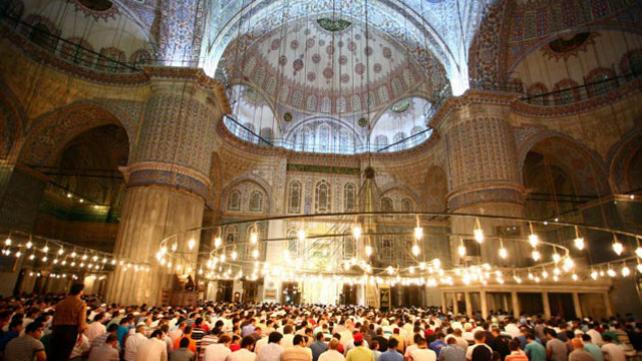
There are times when I wish I lived in a Muslim country, where at least I would feel a sense of fitting in, where I wouldn’t stick out like a sore thumb.
But then there are times when I thank Allah that He’s the Decision-Maker for my life, and not me, because, as I find out every single day, He knows me better than I know myself.
I recently visited a museum in Boston, the Isabella Stewart Gardner Museum. It seemed small on the outside, but when I walked it, it was a feast for the eyes. The museum, which first opened in 1903, was built like a large palace, with an exquisite courtyard in the middle, and surrounding rooms, a total of three floors high.
As I walked through the rooms of the palace, I was amazed by the diversity of Isabella Gardner’s collection. Chinese, Turkish, Korean, American, Italian, French, Persian, as well as countless other artifacts were on display. She spent three decades traveling the world to collect these treasures.
I learned about a famous robbery that took place at this museum in 1990, in which 13 works of art were stolen, including those of Degas and Rembrandt, a total value of $500 million. The stolen pieces were signified by empty frames throughout the museum halls, haunting reminders of an unsolved mystery to this day. Since then, countless efforts have been made to track down the stolen pieces, and now the authorities have announced that anyone who comes forward with the paintings or any information regarding them, will not be penalized.
I thought to myself – what is a painting really worth? Is it made of gold or other precious metals so someone can break it up and sell it? Is it something someone can consume? It can only be discreetly sold on the black market, and even then, the owner cannot publicly show it off, for obvious reasons.
A painting, a piece of literature, these are all made for the intellect, to observe and reflect. Thus, the true value of art and literature is determined by one’s own perception. It’s valuable, if a person truly believes it to be so.
So in actuality, the robbery, the artifacts, all underline a simple statement; these all are people of intellect, who attach immense value to knowledge and inspiration.
Among the artifacts and paintings in the museum, several belonged to the Islamic world. In a room dedicated to works of the Renaissance, a long glass table stood on the side, with a red, velvety cover, which prompted visitors to lift and observe. Lined side by side were pieces of parchment with Arabic script and diagrams. I scanned my guide for an explanation of these pieces, and found out that they were in fact scientific manuals written by Al Jazari, a famous Muslim scientist in the Middle Ages.
My heartbeat quickened as I read further down the page. Isabella Gardner was obviously a woman of a great global mindset. According to the guide, she wanted to showcase the contributions that the Islamic world made to the world, and how it influenced the later Renaissance.
I read this profound statement several times. Here, in a darkened room, in a museum built more than a 100 years ago, in a non-Muslim country, a non-Muslim woman decided to shed light on the magnificent discoveries of MY people, at a time where Muslims had drifted off into the darkness in terms of knowledge and research, a time when they didn’t even care where their literature and art and discoveries were going, and in whose hands they were in.
And that situation has not changed.
The only Muslim-owned museums I know of that are world renowned are the museums in Turkey. That country has managed to preserve some of our history. But what about those people that aren’t able to travel to Turkey in their lifetime? I’ve been to Pakistan several times, a Muslim country that never fails to spark a daily news headline, but I’ve never seen a museum of Islamic history. And yet Pakistan is a country that was established on the foundations of religious freedom, for Muslims to have their own land.
And let’s not forget about Dubai. Trillions of dollars are spent on shopping centers and tall buildings, resorts and entertainment. A disgusting amount of money is spent on New Year’s Eve fireworks. Do we hear of any money being spent trying to retrieve ancient Islamic artifacts, to bring them back to the Muslim world?
How interesting.
If there are Jewish, Christian, Buddhist museums here in the US, then why isn’t there an Islamic history museum? Why isn’t there some credible database in which I can locate each and every Islamic artifact and literature? In order to search in the present databases, I need to know the specific name of what I’m searching for, but what about the thousands of Islamic artifacts and literature that I don’t even know exist?
The answer to these questions is heartbreaking – we Muslims, on a general basis, simply don’t care. And the ones who are passionate cannot do anything big on their own, because, like everything else in the world, these tasks cost money – a lot of money.
Muslims are being dehumanized left and right around the world, through media, by corrupt governments, by individuals, because the world no longer sees the Muslim as a valuable entity.
And that is all our own doing.
We need to step back and study our own foundation, study what has been up in our shelves all along, and start using our intellect to spark meaningful dialogue instead of hollow words.
There is a Hadith that comes to mind after discussing all this:
“The upper hand is better than the lower hand, the upper hand being the one that gives and the lower hand being the one that receives” (Sahih Muslim).
We, collectively, are unfortunately the lower hand. Money is not the only currency in this world. In terms of knowledge, we have been on the receiving end for too long. Instead of teaching, we get schooled. Instead of discovering, we get told. How degrading is it to depend on others to learn about our own world, about our own history, even our own faith?
I know of people who traveled to Europe to study Quranic tafseer, because only these libraries house some of the original copies of research and commentary written by famous Islamic scholars. There was a time when even Thomas Jefferson referred to the Quran to draft the foundations of a new nation. Our Book, our teachings, have benefited countless nations around the world.
Unless and until we grow up as an Ummah, learn to move beyond petty arguments and cultural differences, daily stressors and crippling routines, we can never stand tall in this world and own our past achievements, as well as make new ones. In our Muslim countries, and in the resulting cultures that have trickled down into the West, questioning and discovering better ways to live, improving conditions through changing aspects of culture, especially if the suggestions are made in accordance with Quran and Sunnah, are rejected and ridiculed, even though ironically now even science is slowly affirming the value of our teachings, whether physical, emotional, or psychological.
And the question remains: Why can’t we realize the value of our teachings on our own? Why must we wait for the endorsement of other organizations and statistics and nations before we implement the knowledge into our own lives?
We need historians, filmmakers, researchers, writers, but most of all, we need awareness.
Once we give importance and value to ourselves, only then will the world see us as more than just a nuisance.





Add new comment